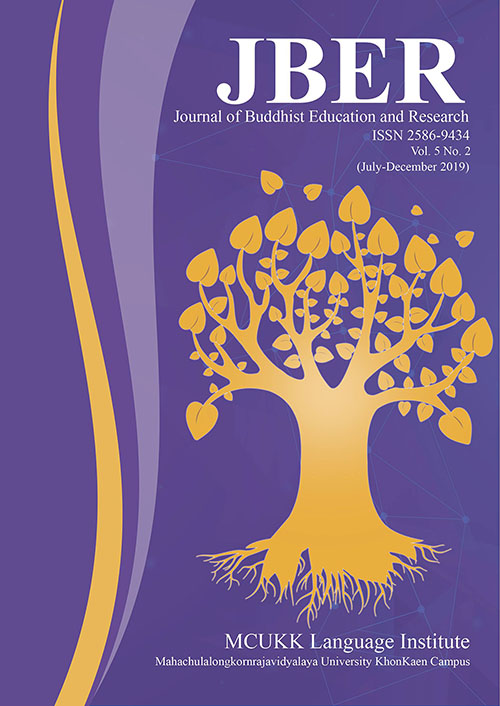THE ROLES OF BUDDHIST MONKS IN DEVELOPING MORALITY AND ETHICS FOR THE YOUTHS IN NONGLAK SUB-DISTRICT CHAI WAN DISTRICT UDONTHANI PROVINCE
Keywords:
Roles of Buddhist Monks, Youths, Morality and EthicsAbstract
The aims of this Research article were: 1) to study the concept related to the roles of Buddhist monks in developing morality and ethics in Buddhism; 2) to study the problems in developing morality and ethics for the youths in the community of Nonglak Sub-district, Chai Wan District, Udonthani Province and 3) to purpose the guideline in enhancing the roles of Buddhist monks in developing morality and ethics for the youths in the community of Nonglak Sub-district, Chai Wan District, Udonthani Province. This research was the qualitative research conducted by analyzing the data from Tipiṭaka, Buddhist academic documents, related researches and the data from interviewing and the results of research were interpreted by descriptive analysis.
The results of research were found that the morality and ethics are the good qualities exhibited by the physical expression as the principles for human beings to trust on for practice in living together happily in society and to apply them at work. Human beings must have the sociality consisting of many people because it seems difficult for one person to work, so that the scope must be laid out for human beings to practice in order to be able to happily work together. The ethics therefore has the tangible characteristics.
The conditions of operational problems in enhancing morality and ethics for the youths in the community of Nonglak sub-district, Chai Wan District, Udonthani province were that the youths’ behaviors as appeared were caused by the undesirable behaviors caused by 1) family in fostering and refining the youths to form behaviors; 2) economy; 3) environment influencing on the youths’ lives to incline in any direction, that is, to increase the number of population, education, to be alienated from Buddhism, residential condition and various paths of ruins, adult behavior imitation, cultural conflict, association with friends and medias.
The ways to enhance the roles of Buddhist monks in developing morality and ethics for the youths in the community of Nonglak Sub-district, Chai Wan District, Undonthani province were that the Buddhist monks must point out the good value for the youths, that is, the opinions, and the family will be the best primary institution for developing it because the good mind is ethics or value because to foster the son to grow is to use the intelligence or mindfulness and ability, not the emotional issue and the children always are influenced by their parents in dividing goodness or badness. To develop the value and the morality is their parents’ responsibility. The school will be the next institution that assists to create them to be strong. The parents must try their best to produce the good person, not to produce the competent person and to produce the intelligent person with the virtue, not to foster the youths with emotion and money. The youths should be fostered to know how to separate the goodness and badness by fostering them how to think. Even though that production requires the patience and the time, if the youths receive the seeds of good virtue from the family and school that are the environments that the youths and if those are the good environments, we will get the good youths in the future. If the mind is good and the behavior will not be in ruin. The youths must be protected from the evil by performing good deeds only. Importantly, the adults must be a good model for the sake of the youths’ good virtue in the future, especially the adults are in the status of various leaders in Thai society.
References
พระไพศาล วิสาโล. (2529). อำนาจและยุทธวิธีไร้ความรุนแรง. กรุงเทพฯ: โรงพิมพ์จุฬาลงกรณ์มหาวิทยาลัย.
พระวิเชียร สีหาบุตร. (2537). บทบาทพระสงฆ์กับการพัฒนาสังคม. วิทยานิพนธ์ปริญญามหาบัณฑิต. บัณฑิตวิทยาลัย: มหาวิทยาลัยศิลปากร.
พระสรวิชญ์ อภิปญฺโญ และ ดร.นิเวศน์ วงศ์สุวรรณ. (2553). การสร้างและพัฒนารูปแบบการลดพฤติกรรมความรุนแรงของวัยรุ่นตามแนวทางพระพุทธศาสนา. บัณฑิตวิทยาลัย: มหาวิทยาลัยมหาจุฬาลงกรณราชวิทยาลัย.
พินิจ ลาภธนานนท์. (2532). บทบาทพระสงฆ์ในการพัฒนาชนบท. กรุงเทพฯ: มหาวิทยาลัยศรีนครินทรวิโรฒ ประสานมิตร.
วันชัย ปานจันทร์. (2545). บทบาทพระสงฆ์ในการดูแลเด็กและเยาวชนที่พักอาศัยในวัด ศึกษาเฉพาะกรณีพระสงฆ์ในเขตธนบุรี. มหาวิทยาลัยธรรมศาสตร์.
สมคิด เพ็งอุดม. (2535). การศึกษาบทบาทของพระสงฆ์ ที่มีต่อการพัฒนาชุมชน ตามทรรศนะของพระสงฆ์ และเจ้าหน้าที่สี่กระทรวงหลักระดับตำบล ในจังหวัดสมุทรสงคราม. มหาวิทยาลัยศรีนครินทรวิโรฒ ประสานมิตร.





